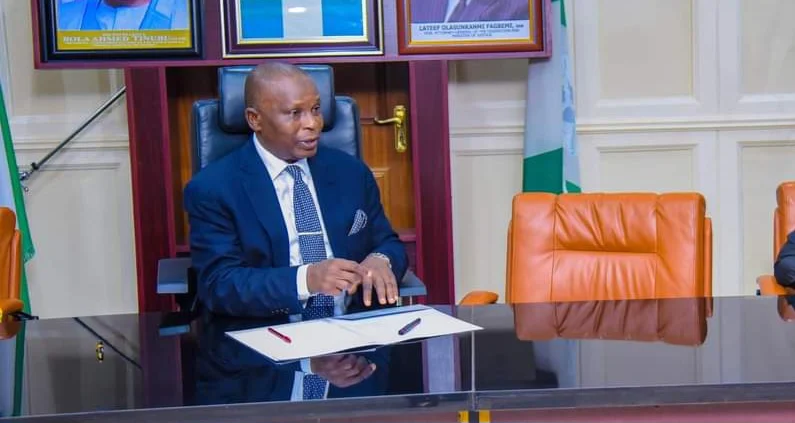AGF Fagbemi Addresses Public Fears: Presidential Clemency Process Still Under Strict Review Amid Nigeria’s Justice Backlash
Public outcry erupted across Nigeria this week after reports surfaced of President Bola Tinubu granting clemency to high-profile convicts, including those jailed for murder and drug trafficking. Now, the nation’s top legal officer steps in to calm the storm, assuring citizens that no one walks free just yet.
Attorney General of the Federation and Minister of Justice, Prince Lateef Fagbemi (SAN), issued a firm clarification on Thursday, October 16, 2025, emphasizing that the presidential prerogative of mercy remains in its final administrative review phase. In a statement signed by his office, Fagbemi stressed that despite the Council of State’s approval, no inmate has been released from custody. This comes hot on the heels of widespread concerns over the list of 145 beneficiaries—82 granted full pardons, 65 with reduced sentences—sparked by trending debates on presidential clemency process, AGF Fagbemi clarification, prerogative of mercy Nigeria, Tinubu pardon controversy, and public backlash on clemency.
Fagbemi, who chaired the Presidential Advisory Committee on Prerogative of Mercy, detailed the meticulous steps involved. The process, rooted in Section 175 of the 1999 Constitution, begins with applications flooding the AGF’s office—overwhelming volumes since the committee’s January inauguration. The committee reviews petitions, conducts facility visits across Nigeria’s six geopolitical zones, and recommends candidates based on merits like remorse, rehabilitation potential, and prison overcrowding relief. Recommendations then go to the Council of State for presidential nod.
But here’s the key: Approval isn’t the endgame. Fagbemi highlighted the “instrument of implementation” stage—a mandatory verification to cross-check names against legal standards, flagging any discrepancies for correction. “This stage affords an opportunity for a final look at the list for remedial purposes, if any, before the instrument is forwarded to the Controller-General of Corrections,” he noted. Only then does the Nigerian Correctional Service (NCoS) act. This protocol, Fagbemi insisted, isn’t a delay but a safeguard for transparency and the rule of law.
The controversy ignited last week when details leaked of the beneficiaries, including Maryam Sanda—convicted in 2020 for murdering her husband Binta Ahmadu over infidelity suspicions—and others like drug traffickers, illegal miners, and even posthumous nods to figures from past regimes, such as the Ogoni Nine activists. Social media exploded with hashtags decrying “soft justice” for serious crimes, while civil society groups like the Socio-Economic Rights and Accountability Project (SERAP) warned it could undermine deterrence against drug syndicates fueling insecurity.
Legal experts have weighed in sharply. Professor Yemi Akinseye-George, a constitutional lawyer, praised the review phase as “a bulwark against arbitrary power,” arguing it aligns with global best practices seen in U.S. presidential pardons. But human rights advocate Ifeanyi Odili called the inclusion of violent offenders “tone-deaf,” urging stricter criteria amid Nigeria’s rising crime rates. Fagbemi himself acknowledged the uproar, thanking Nigerians for their “vigilance,” which he said bolsters governance. “Public engagement is always welcome, as it demonstrates that Nigerians care deeply about justice,” he added.
This isn’t Nigeria’s first rodeo with clemency sparks. Back in 2022, ex-President Muhammadu Buhari pardoned 159 inmates, drawing similar flak for freeing financial fraudsters. Yet proponents, including prison reform advocates, point out overcrowding—Nigeria’s facilities hold over 80,000 against a 50,000 capacity—as a humanitarian driver. The Tinubu administration frames these exercises as rehabilitative, targeting “remorseful” cases to ease fiscal burdens on the justice system.
For everyday Nigerians, the stakes feel personal. In a country grappling with banditry, cult clashes, and opioid epidemics—where drug arrests surged 25% last year per NCoS stats—the fear is that rushed releases could embolden criminals, hitting communities hardest. Economically, decongesting prisons could free up billions in upkeep costs, redirecting funds to victim support or anti-crime tech. Politically, it tests Tinubu’s reform pledges; a botched process risks eroding trust in his anti-corruption drive. On lifestyle fronts, safer streets from balanced mercy could mean more secure markets and schools, though skeptics worry about vigilante justice spikes if faith in courts wanes.
User intent in probing this boils down to seeking reassurance: Is justice for sale, or is the system self-correcting? Fagbemi’s update manages that by doubling down on procedural rigor, signaling the government’s ear is open to feedback—potentially tweaking the list before seals break.
As the review wraps—expected imminently—eyes stay glued on Abuja. This episode spotlights the delicate dance of mercy in a democracy: balancing compassion with accountability. With public scrutiny at fever pitch, the presidential clemency process, AGF Fagbemi clarification, prerogative of mercy Nigeria, Tinubu pardon controversy, and public backlash on clemency will likely dominate headlines, shaping how Nigeria polices its power of forgiveness.
By Sam Michael
Follow and subscribe to us for push notifications to stay updated on the latest Nigerian political news.
AGF Fagbemi, presidential clemency Nigeria, Tinubu pardon list, prerogative of mercy review, Maryam Sanda clemency, public outrage pardon, Nigerian justice reform, Council of State approval, inmate release process, constitutional mercy powers
